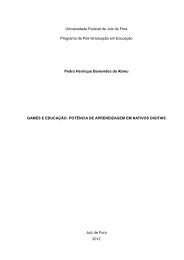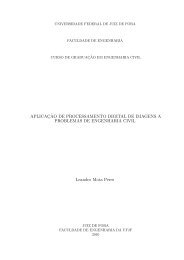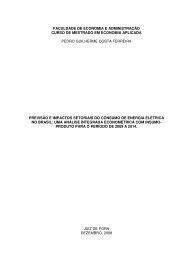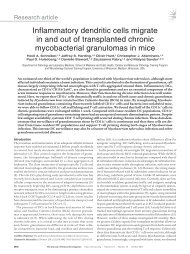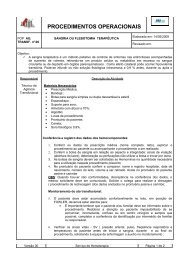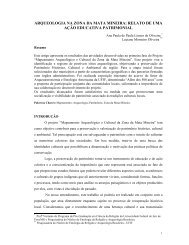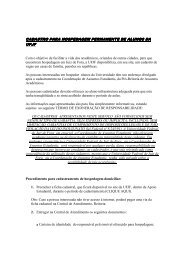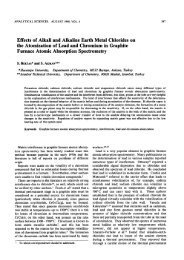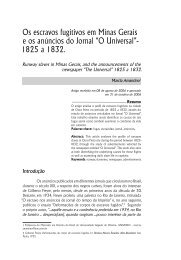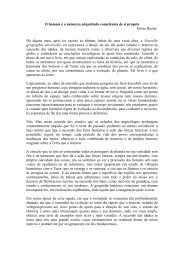Volume 6 | Número 2 Julho - Dezembro de 2012 - Universidade ...
Volume 6 | Número 2 Julho - Dezembro de 2012 - Universidade ...
Volume 6 | Número 2 Julho - Dezembro de 2012 - Universidade ...
Create successful ePaper yourself
Turn your PDF publications into a flip-book with our unique Google optimized e-Paper software.
Psicologia em Pesquisa | UFJF | 6(02) | 190-192 | <strong>Julho</strong>-<strong>Dezembro</strong> <strong>de</strong> <strong>2012</strong><br />
what is the implication of this distinction for the<br />
historiography of Psychology? Which limitations<br />
do you notice for using these categories? Could<br />
they merge, for example, when we consi<strong>de</strong>r the<br />
different conceptions of science that followed in<br />
the history of Psychology?<br />
Gundlach: Historiographers of Psychology should<br />
keep in mind this distinction whenever they try to<br />
come to abstract conclusions about Psychology. The<br />
distinction is, of course, not very useful when there<br />
was no discipline of Psychology — but then, some<br />
historians do not realize that there was in times of no<br />
discipline nonetheless a science of Psychology. Take, for<br />
example, Helmholtz. At his <strong>de</strong>mise centenary, many<br />
historians had congresses with topics like Helmholtz<br />
and physics, Helmholtz and physiology, Helmholtz<br />
and neurology, Helmholtz and perception, and so on.<br />
Nobody talked about him and psychology, because<br />
he was not a psychologist — a rather simple-min<strong>de</strong>d<br />
argument. But, he certainly ma<strong>de</strong> many important<br />
discoveries that belong to the science of Psychology,<br />
in times when the disciplinary status of psychology<br />
was next to nonexistent.<br />
5. Psicologia em Pesquisa: Still consi<strong>de</strong>ring the<br />
distinction between science and discipline, how do<br />
you see their reciprocal influence? How should we<br />
conceive the influence of Psychology as a discipline<br />
on its <strong>de</strong>velopment as a science, as well as their<br />
relation to its professionalization?<br />
Gundlach: A very complicated issue — a prominent<br />
influence concerns the boundaries. A discipline may<br />
tend to draw boundaries for its subject, which may not<br />
coinci<strong>de</strong> with those of science. Look at all the work<br />
done on topics of psychology insi<strong>de</strong> the disciplines<br />
of biology, physiology, neurology, psychiatry, etc.<br />
All these things may appear as not belonging to<br />
psychology, because they were done by people or<br />
institutions that are not specialists in the discipline<br />
of psychology.<br />
6. Psicologia em Pesquisa: Psychological<br />
instruments are one of the subjects of your interest.<br />
You have proposed a History of Psychology (as<br />
science and as discipline) based on the History of<br />
Psychological Instruments. Since the <strong>de</strong>finition<br />
of a psychological instrument has not only a<br />
conceptual aspect, but also a contextual one, can we<br />
say that in this kind of history we would find some<br />
equilibrium between externalist and internalist<br />
perspectives of the historiography of psychology?<br />
Gundlach: As a large number of psychological<br />
instruments were conceivable and realizable only<br />
after discoveries in physics and related sciences, and<br />
inventions and <strong>de</strong>velopments in technology were<br />
ma<strong>de</strong>, the use of instruments in psychology is certainly<br />
an area in which the intertwining of external and<br />
internal factors is very prominent. Another matter<br />
is, of course, psychological research financing. Since<br />
most instruments are or were expensive, their use<br />
(as well as the nonuse of very expensive instruments<br />
available in the market) is another aspect where both<br />
factors are of interest.<br />
7. Psicologia em Pesquisa: Psychology and<br />
philosophy are interrelated fields of knowledge<br />
regarding the nature of their subject matter.<br />
However, the training of new psychologists in<br />
Brazil seems to be increasingly distant from a<br />
philosophical reflection. We would like to know<br />
how you see this relationship and its situation in<br />
your country.<br />
Gundlach: As Wundt and other people stated:<br />
‘any science is interrelated with philosophy, and<br />
psychology probably as much as physics or cosmology.’<br />
The conceptual problem is the following: authors<br />
like Descartes, Locke, Leibniz, Wolff, Aristotle and<br />
Plato are classified as philosophers. Therefore, some<br />
psychologists assume that they are of only marginal<br />
interest for psychology. However, in their days the<br />
concept of philosophy was much broa<strong>de</strong>r than it is<br />
nowadays. Only some of their i<strong>de</strong>as belonged to the<br />
present discipline of philosophy, others belonged to<br />
psychology, etc.<br />
One of the issues of the present relation between<br />
adherents of psychology and those of philosophy<br />
seems to be that in the latter there is still some kind<br />
of nonempirical psychology in the making (philosophy<br />
of mind or similar fields), which consist of reflections<br />
on folk psychology (everyday psychology, coffeehouse<br />
psychology, whatever you want to call it). This fact to<br />
psychologists looks as being far below present scientific<br />
standards of psychological research — and also afraid<br />
of expressing quantities in numbers —, therefore a<br />
waste of time. While, on the other hand, philosophers<br />
Entrevista com Horst Gundlach 191



